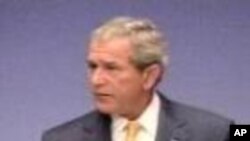President George W. Bush is urging nations to continue pressuring the Iranian government to stop uranium enrichment activities and to disclose the full scope of its nuclear program. Enriched uranium can be used to produce nuclear energy or the fissile material for a nuclear bomb.
The United Nations has repeatedly demanded that Iran suspend its proliferation-sensitive nuclear activities, including enrichment of uranium. “The Iranian nuclear issue is a problem and continues to be a problem that must be addressed by the international community,” says President Bush.
Mr. Bush spoke after a new U.S. intelligence report said the Iranian regime had halted its clandestine nuclear weapons program in the fall of 2003. The report also said that “convincing the Iranian leadership to forgo the eventual development of nuclear weapons will be difficult given the linkage many within the leadership probably see between nuclear weapons development and Iran’s key national security and foreign policy objectives, and given Iran’s considerable effort from at least the late 1980s to 2003 to develop such a program.”
President Bush says the new report makes it clear Iran has more to explain about its nuclear intentions and past actions, and that the Iranians have a “strategic choice to make”:
“They can come clean with the international community about the scope of their nuclear activities and fully accept the long standing offer to suspend their enrichment program and come to the table and negotiate, or they can continue on a path of isolation that is not in the best interest of the Iranian people.”
U.S. State Department Deputy spokesman Tom Casey says keeping up the international pressure on Iran is crucial:
“International pressure, we believe, has caused them to suspend the weaponization program; [but] the fact that they are continuing to pursue, in defiance of U-N resolutions and the will of the international community, the most important and often most difficult component of producing a nuclear weapon –- getting enough highly enriched uranium to be able to turn into a nuclear device -- I don’t think should provide people with comfort.”
Sustaining pressure on Iran’s leaders, says Mr. Casey, is needed to “keep them both from returning to a weaponization program, as well as making sure that we prevent them from obtaining the major piece of know-how required to ultimately produce such a weapon.”




